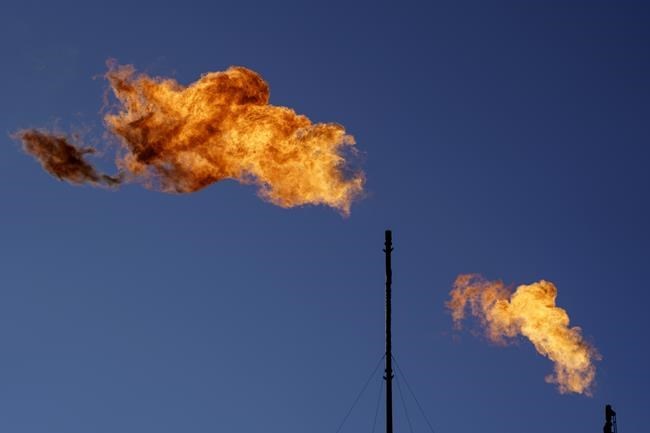The controlled release or burning of methane from oil and gas production sites will be almost entirely barred in Canada by 2030 under proposed regulations outlined Monday by Environment Minister Steven Guilbeault.
The proposed regulations seek to implement a new target to cut methane leaks and releases from the oil and gas industry by at least 75 per cent over 2012 levels by 2030.
Existing regulations target a 40 to 45 per cent cut by 2025.
"By tackling methane emissions, we're activating one of the most powerful levers we have against climate change," Guilbeault said Monday at a methane event at COP28, the United Nations global climate talks currently taking place in Dubai.
Methane doesn't stay in the atmosphere as long as carbon dioxide, but it is better at trapping heat, so cutting methane emissions is considered one of the most effective ways of reducing global warming.
Because some of the trapped methane can be sold, lowering methane emissions is also among the most cost-efficient measures for the industry.
A 2021 federal report claimed Canada was on track to meet its 2025 target, though more recent analyses question the progress. That is because measuring methane leaks and releases has been shown to vastly under-report the actual levels of methane being emitted.
Guilbeault touched on that problem, announcing $30 million for a methane "centre of excellence" to improve methane reporting.
The draft regulations themselves won't be published until mid-December, but an outline presented by Guilbeault Monday estimates it will cost about $15 billion to industry to implement the regulations between 2027 and 2040. It also says the regulations should keep more than 200 million tonnes of greenhouse gas emissions from the atmosphere over that 13-year period.
The key part of the regulations requires oil and gas companies to stop flaring or venting methane from their sites with some exemptions for safety reasons.
Flaring is the intentional burning of waste methane, which is a byproduct at natural gas and conventional oil production sites. Venting is the intentional release of methane.
The sites also contribute methane through fugitive emissions, which are unintentional equipment leaks. The regulations also require more inspections and better fixes of those leaks.
Methane contributed to just under 14 per cent of Canada's total emissions in 2021, and the oil-and-gas industry accounted for 40 per cent of that. Existing regulations to cut methane are already showing success, with more than nine million tonnes eliminated in 2020 alone.
Alberta Premier Danielle Smith, who is at COP28, slammed the new regulations in a statement, calling them "costly, dangerous, and unconstitutional."
Smith flat out rejected a total ban on flaring, calling it "a critical health and safety practice."
The proposed regulations include an exemption for safety reasons.
She also said Ottawa should be following Alberta's "award-winning approach" on methane.
The province is one of three that uses its own methane regulations for the 2025 target, however those regulations were adjusted through negotiations with Ottawa to ensure they would hit the same reductions. Ottawa signed an equivalency agreement with Alberta, Saskatchewan and British Columbia for them to use their regulations.
Climate campaigners had raised concerns about whether the leaders of Alberta and Saskatchewan, two provincial premiers attending COP28, would use the spotlight of a global climate summit to elevate their fight against federal climate targets.
A statement from the Saskatchewan government also criticized the proposed regulations as stepping into provincial jurisdiction.
"This amounts to a production cap by default and is another instance of federal overreach and changing goalposts," said the statement. "It also violates the current equivalency agreement, which Saskatchewan signed with the federal government in 2020."
The new regulations would not come into effect until 2027. The equivalency agreement with Saskatchewan expires on Dec. 31, 2024.
While some provinces may consider the new draft methane regulations too stringent, it’s not a constitutional issue, said Stewart Elgie, a professor of economics and law at the University of Ottawa who has successfully argued environmental cases before the Supreme Court of Canada.
"This is really a fight with (Prime Minister Justin) Trudeau about the pace of emissions reductions," Elgie wrote in an email to The Canadian Press, in response to Smith's statement.
"Premier Smith has to stop disguising her climate policy disagreements as constitutional fights."
Fifty oil companies representing half of global production, including Shell and ExxonMobil, signed a pledge announced at COP28 this weekend to reduce their methane emissions to near-zero by 2030. Cenovus, a Calgary-based energy company, is shooting for an 80 per cent methane reduction from 2019 levels by 2028.
In a statement, a coalition of Canadian climate organizations, including Environmental Defence and Greenpeace Canada, applauded the new draft regulations, while stressing the importance of bringing in independent, accurate methane emissions reporting.
The International Energy Agency has said global methane emissions were 70 per cent greater than what had been reported by national governments. Meanwhile, a peer-reviewed study out of Carleton University's Energy and Emissions Research Lab indicated emissions of methane from Alberta's energy industry were underestimated by nearly 50 per cent.
"Today's funding announcement for an independent body to ensure the government has access to real-time methane measurements, independent from industry, is so critical," said Julia Levin, associate director of national climate with Environmental Defence Canada.
"Of course, the best way to eliminate methane pollution is by ending the production of oil and gas. And that's the goal here at COP28 – to leave here with an agreed upon timeline to phase out fossils (fuels)."
This report by The Canadian Press was first published Dec. 4, 2023.
Mia Rabson and Jordan Omstead, The Canadian Press




